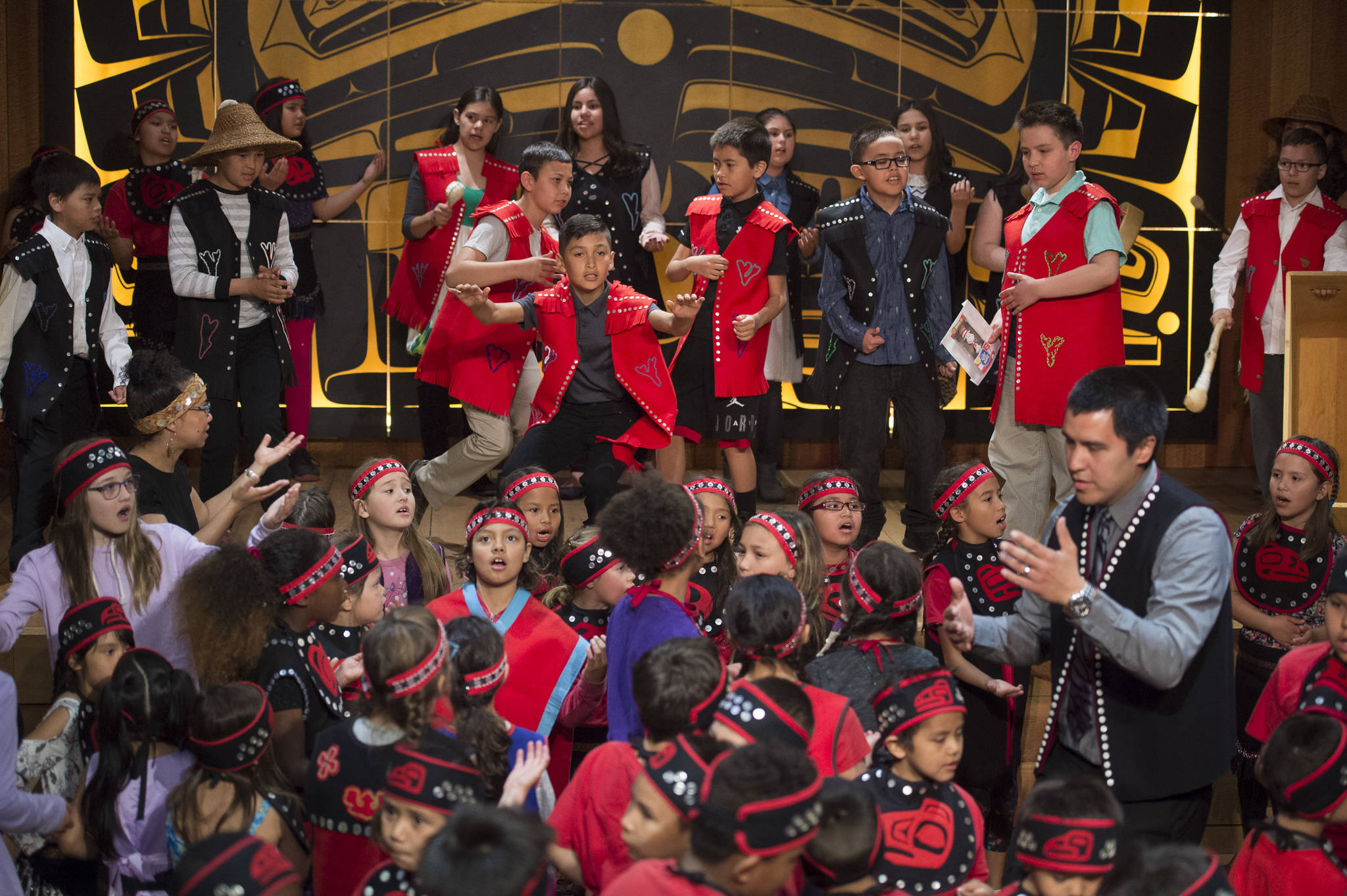Forget flipping a tassel and throwing a cap, these graduating students donned vests and danced them to life.
Tlingit Culture Language & Literacy, an optional program in the Juneau School District housed at Harborview Elementary that works indigenous tradition into its curriculum, held a fifth-grade promotion ceremony Wednesday morning in the Shuká Hít clan house at Sealaska Heritage Institute’s Walter Soboleff Building.
The event combined commonplace aspects of an elementary school graduation —speeches, presentation of certificates and joyful tears — with the cultural characteristics that set the program apart from a more typical primary education.
“Thank you for singing your songs, thank you for speaking your language and thank you for bringing our culture into the 21st century,” said SHI President Rosita Worl during welcoming remarks.
[Music from around the world comes to clan house]
Worl told the young students and their gathered loved ones that there was a time when Tlingit language and culture was not taught in schools, as well as a time when Alaska Natives encouraged youngsters to only learn English so they could “run their lives in this new world.”
“They weren’t thinking at the same time, we might lose our language,” Worl said.
Alaska Native languages were declared endangered by the Legislature and Gov. Bill Walker in 2018, and there are about 200 fluent Tlingit speakers worldwide, according to the Endangered Languages Project.
The next step in the students’ Tlingit language and culture education is not entirely clear, said Michelle Martin, a fourth and fifth grade teacher. Martin said while there are some after school programs, there is not a middle school equivalent of TCLL.
“That’s that link in between we really need,” Martin told the Juneau Empire after the ceremony.
Martin said there are more Tlingit-language options available to students at the high school and collegiate levels.
However, Martin said she is hopeful family support and summer activities will help keep students engaged with indigenous culture and languages.
Worl and other speakers such as Tlingit language teacher Paul Marks Sr. told the young students to continue to value their culture as they move through their academic careers and simultaneously to take their studies seriously.
“Our traditions, our culture, those are the things that make us strong and made us strong for 10,000 years,” Worl said. “We need teachers. We need scientists. We need accountants. Think about our future, think about what we need.”
Those traditions were on full display during the ceremony.
[The miracle happening in Juneau classrooms]
A new collaborative stop-motion paper art short, “Voices on the Land,” was shown. It was made by all fourth- and fifth-grade classes at Harborview, including TCLL classes, and it told attendees about Juneau and TCLL using Tlingit-language words.
For example, student narration noted yáay, which means humpback whale, and keét, which means killer whale, could be found in the waters near Dzantik’i Heeni, a Tlingit name for the Juneau area.
Children sang and danced to their Outside Song, “At Wooskú Daakahídi Naaxh Xhát Sitee,” among others, Tlingit elders who are present in TCLL classrooms spoke and the students were presented with traditional vests.
[How Tlingit speakers are coining new words]
Martin said materials for the vests were procured with help from Goldbelt Heritage Foundation, Indian Studies Program and parents seeking donations from Alaska Native organizations.
“They’ve got to dance to bring this regalia alive,” Martin said before students and family members in the audience did exactly that.
Speakers, such as elder David Katzeek, said throughout the event said the children gathered are the future and should be praised.
“They’re leaders,” Katzeek said. “These are the ones to cheer, to scream, to holler about.”
• Contact arts and culture reporter Ben Hohenstatt at (907)523-2243 or bhohenstatt@juneauempire.com. Follow him on Twitter at @BenHohenstatt.

